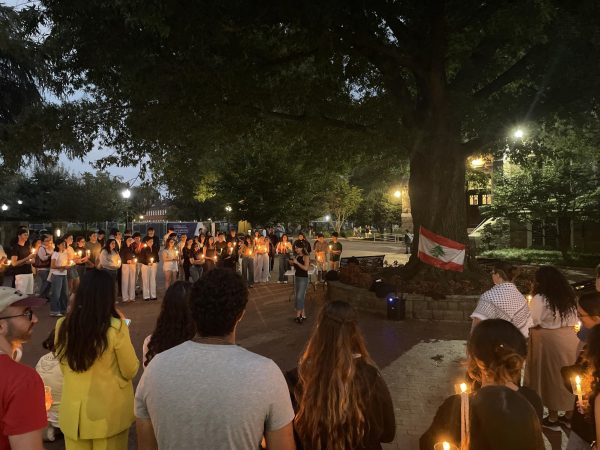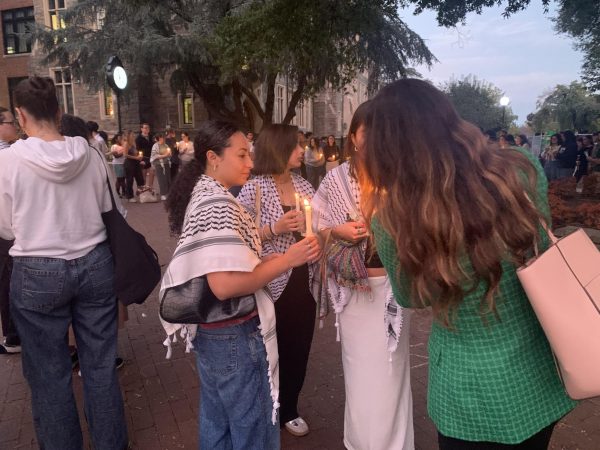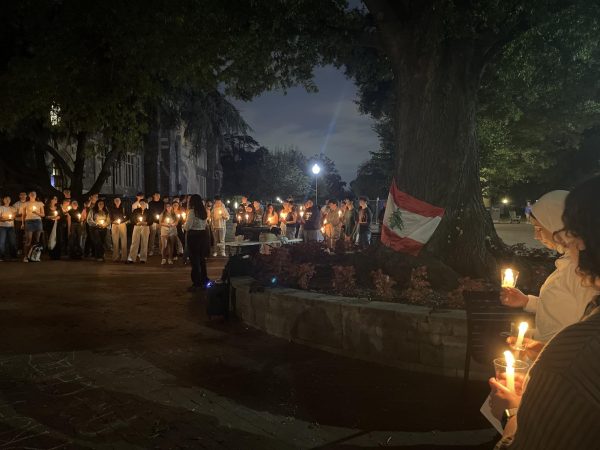Over 100 members of the Georgetown University community commemorated the victims of Israeli air strikes in southern Lebanon at a candlelight vigil Oct. 4 in Red Square.
At the vigil, organized by the Lebanese Student Association (LSA), Georgetown Arab Society and the Georgetown chapter of Students for Justice in Palestine (SJP), attendees lit candles and listened to speeches. During an open-mic portion of the vigil, eight attendees recited poems in condemnation of ongoing violence against civilians.
Israel began an aerial bombing campaign against Lebanon Sept. 19, which has since killed more than 1,000 people in Lebanon and displaced approximately 900,000 people, according to United Nations estimates. According to Lebanon’s health ministry, nearly a quarter of those killed have been women and children.
Romy Abu-Fadel (SFS ’26), an LSA board member, said the club wanted to hold the vigil so that students with connections to Lebanon could support each other.
“I think a lot of us feel very paralyzed and we feel like we want to help but what can we do?” Abu-Fadel told The Hoya. “I thought this could be really good to bring people together because everyone that I’ve been speaking to in the Lebanese community, Arab community, we just feel very deeply alone here, and we know that we have each other, but we don’t really reach out to lean on each other.”
“It was just people who need support coming together,” Abu-Fadel added. “We need to mourn but we also need to be called to action.”

Nabil Abdallah (GRD ’25) and Ryan Abdallah (MSB ’25) addressed the crowd to help inspire hope and optimism among the student body, while mourning for their loved ones.
Nabil Abdallah said the event helped to give strength to Georgetown’s Lebanese community as they worry or grieve over relatives abroad.
“I think it’s important to give strength and hope to the people,” Abdallah told The Hoya. “Everyone came here, they united together. They saw that they’re not alone. There’s other people sharing the same feelings with them.”
Individuals of the Georgetown community embraced one another during the vigil, with an open-mic session in which students read poetry and spoke about their concern on the ongoing violence in Lebanon.
An attendee of the vigil said the muted international reaction to the violence has revealed a double standard about which lives are deemed important.
“It really goes to show how Arab lives are completely devalued because people are not really even — they’re not fazed seeing entire neighborhoods, residential neighborhoods being targeted, civilians dying at a high rate,” the attendee told The Hoya. “We’re seeing people see this as completely normal — as just a routine event — and it truly isn’t, and I think this vigil is just a reminder of that.”
Abu-Fadel said the vigil helped provide support students felt they were not getting elsewhere.
“I wish that people knew that we’re not okay,” Abu-Fadel said. “We look like we’re doing fine, we’re operating, but our country, our people are being bombed. We never know what’s going to happen the next morning we wake up. We’re very deeply scared. And I think we wish that there was more support coming from not just us, from external factors as well.”
“It’s just about knowing that we’re supported, and I don’t think that we felt that very deeply. And we hope to in the future, but until then we’ll just uplift ourselves,” Abu-Fadel added.

Although many of the attendees had a connection to Lebanon, other attendees such as a staff member from the Gender+ Justice Initiative (G+JI), a university-wide initiative that researches gender equity, came to the vigil to support Lebanese community members.
“I wanted to be here in solidarity with Lebanese people,” the staff member told The Hoya. “I’m just a human being who cares about lives in the world.”
The staff member said that it is important for staff members to stand up for students’ advocacy for human rights.
“I think it’s really important that students see that we are supporting them,” the staff member said. “Most of the people here are Lebanese students who have families who are right now either being bombarded — or if they’re not being bombarded, could be bombarded — and they’re just very worried.”
Students shared their hopes for what comes after the vigil, mourning their friends and families in Lebanon. Other students called for change and urged rallygoers to start speaking up and advocating for peace in the Middle East.
Abu-Fadel said she hoped the global community could recognize Lebanon’s culture and beauty beyond its role in ongoing conflicts.
“I wish Lebanon would stop showing up in the headlines as a place of conflict and violence because it is a beautiful country with beautiful people, a beautiful culture,” Abu-Fadel said. “I wish we could shed more light on that.”

“Unfortunately this is the current state of affairs, but remember that this isn’t us and this isn’t our constant state,” Abu-Fadel added. “We are a country of peace and love, and our people are beautiful.”
Ryan Abdallah said the vigil brought people together who will be important in bringing change to Lebanon.
“We want to be the future for our country,” Abdallah told The Hoya. “We want to bring people hope. You want them to understand that. Change can happen, change will happen and we should be the ones leading it. We shouldn’t stand on the sidelines if we aren’t satisfied.”
Nabil Abdallah said that it was important for individuals to channel their emotions in a way that benefits the unity of the country and the Lebanese community.
“It’s important to have the power to fight back, to speak out, to basically take all of that energy and direct it to good rather than to bad,” Abdallah said. “Take all of the energy that you’re feeling. All these emotions are very powerful, and try to direct them to change in a way that’s beneficial for the country.
This article was updated March 23, 2025, to retract the identity of the GJI staff member. This article was also updated April 19, 2025, to retract the identity of a student at the vigil. The staff member and the student requested anonymity due to safety risks.